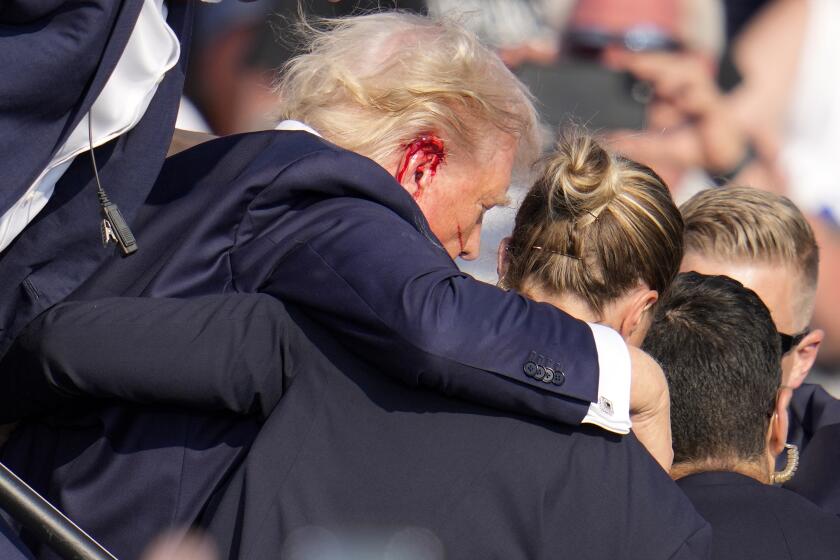Column: Is replacing President Biden as his party’s nominee an attack on democracy? Hardly

- Share via
Before the coronation of Kamala Harris is complete, I want to ask a question: What’s wrong with the Democratic Party picking a candidate without putting it to voters?
Most defenses of the primary election process fall into three broad categories: the lazy, the idealistic and the practical.
The lazy answers boil down to the idea that primaries are the way we’ve always chosen the parties’ nominees. I’ve been amazed by how many people responded to the idea of the Democratic convention choosing Biden’s replacement by saying “We’ve never done this before.” The truth is that brokered conventions were how we always did it until 1972, when the primary system was adopted. Until then, political scientists regarded democracy as the stuff that happens between political parties, not within them.
The assassination attempt, the Supreme Court’s immunity ruling and Aileen Cannon’s dismissal of the classified documents case all elevated the Republican’s chances.
The idealistic defense of the primaries is basically that we are a democracy so the parties must be democratic. Taken seriously, this would mean we weren’t a democracy until the 1970s. It would also mean that nearly all the countries we call democracies aren’t, because the vast majority don’t rely on primaries the way we do to select party nominees.
When I argue that the parties should be less democratic, people often look at me as if I have hooves. “Don’t you like democracy?” they demand. “Isn’t democracy a good thing?” My answer to these questions is an emphatic “Yes, but.”
For starters, lots of institutions that are essential to democracy are not internally democratic. The free press is indispensable to democracy, but no newspaper, network or magazine puts editorial decisions up for a vote of the whole staff. The whole point of having editors is to impose sound judgment on an often chaotic process.
When you think about it, no major American institution other than legislatures is internally democratic the way our major parties now are — and even Congress has checks on its internal democracy. No one thinks hospitals, the Catholic Church or the Marine Corps should put their leaders or major decisions up for a vote. “Colonel, we asked for a show of hands, and we’ve decided not to take that hill.”
Florida Sen. Marco Rubio recently advocated for industrial policy, the sort of state intervention in the economy that was long anathema to conservatives.
One of the main drivers of political polarization today is that the parties have been captured by the most extreme and uncompromising voters, and responsible leaders have precious few mechanisms for restraining them. The result is that primaries yield general election candidates who are less representative and more beholden to extremists.
The third, practical defense of primaries is rooted in their history as a uniquely American invention. Primaries were first deployed in the Progressive Era as a way to counter the corrupt dysfunction of party machines. But they were conceived as one tool among many. Until 1972, the year Biden was first elected to the U.S. Senate, nobody thought primaries should be the only means of picking candidates.
Primaries do have benefits. They can help vet general election candidates by giving the media and political rivals opportunities to expose their weaknesses before it’s too late. One reason many Democratic insiders are worried about the prospect of nominating Harris is that she hasn’t won a truly competitive election in recent years. Others say she’s the best choice partly because she was tested (with mixed results) in the 2020 Democratic primary campaign.
But I have yet to meet an informed Democratic insider who thinks Harris is the best candidate to run against Donald Trump. She might be the best possible candidate given the calendar, campaign finance rules and political considerations, but that’s a different argument. Given that Biden and Harris are the most unpopular president and vice president in the history of modern polling, party elders might have chosen to deny both of them the nominations if they could have.
Indeed, for all the claims that Biden’s political defenestration was the work of party elites overruling voters, the truth is that voters had been telling pollsters they didn’t think Biden should run again for years. In a sense, the party will be more responsive to the will of voters by ignoring Biden’s primary victories.
Beyond the minimal legal, constitutional, patriotic and moral constraints all parties are supposed to respect, they really have one job: winning general elections.
Given that Democrats believe — with good reason — that the Republican nominee does not care about any of those constraints, their only concern should be defeating him. If democracy for the whole country is on the ballot, nominating a winning candidate should be the party’s overriding goal.
More to Read
A cure for the common opinion
Get thought-provoking perspectives with our weekly newsletter.
You may occasionally receive promotional content from the Los Angeles Times.













